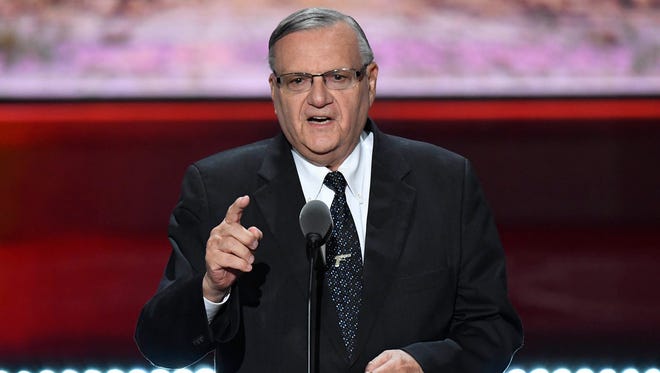What's next in criminal-contempt case of Sheriff Joe Arpaio?

PHOENIX — A U.S. District Court judge in Phoenix may have referred Maricopa County Sheriff Joe Arpaio for criminal prosecution after finding him in contempt of court, but what that means for Arpaio is far from clear.
Judge G. Murray Snow asked that the U.S. Attorney's Office for the District of Arizona look into prosecuting the case, but what that office and U.S. Attorney John Leonardo do remains to be seen.
"Potentially everything is on the table right now," said Leonardo's spokesman, Cosme Lopez. "There is no timeline, unfortunately."
And there is no firm protocol for prosecuting a high-placed and high-profile law-enforcement officer.
Activists seek Sheriff Joe Arpaio prosecution for criminal contempt
As former U.S. Attorney for Arizona Paul Charlton said, "If they were researching this case through books instead of electronically, they would literally be blowing dust off the volumes, because no one has done it before."
Here are some frequently asked questions and answers:
What charges would Arpaio face?
Charges remain up in the air.
In his Friday order, Snow made findings that Arpaio potentially committed criminal contempt of court for violating a court order not to enforce federal immigration law and for failure to produce materials related to an investigation that Arpaio's people had conducted into Snow.

Criminal contempt is usually charged as a misdemeanor, legal experts said.
Snow also found that Arpaio and his top deputy, Jerry Sheridan, had lied to Snow, which could lead to more serious charges of perjury and false declaration before a court, both felonies.
Who would prosecute Arpaio?
Which federal prosecutor will handle the case is uncertain.
Federal statute says that the judge can take direct action and punish the person in contempt directly for offenses committed during trial.
However, the usual process is to refer the matter to federal prosecutors, as Snow did.
Snow referred the case to Leonardo. Leonardo could prosecute the case or refer it to another office, or to the U.S. Department of Justice. If those agencies decline, the judge can appoint another attorney as prosecutor.
There are two types of conflict of interest in the legal system: actual conflict and appearance of conflict. Either of those could come into play in this case.
Federal judge refers Ariz. sheriff for criminal contempt
Courthouse regulars, including Arpaio's defense attorney Mel McDonald, himself a former U.S. attorney, think that Leonardo will "build a wall" separating him personally from the case because he has been involved in litigation involving Arpaio.
Leonardo has the option of passing the case to the U.S. Department of Justice. But the department also played a role in the criminal-contempt hearings against Arpaio and brought suit against him for immigration issues related to the court orders that Arpaio defied in the first place.
Most observers believe that Leonardo will ask another U.S. Attorney's Office to consider the case, and they believe it probably would be a district within the 9th U.S. Circuit, such as those offices based in Los Angeles and San Diego.
What would be the next step?
A case can get into the federal court system in several ways.
Federal prosecutors can file charges "by information," that is, by presenting the case directly to a judge to establish probable cause to go forward. Snow has already made contempt findings after conducting extensive hearings, which might carry weight with the judge to whom a criminal case is referred.
Judge strips Arpaio of some internal affairs oversight
But given the political nature of Arpaio's case, if a decision is made to seek felony charges, the prosecutor more likely will ask an Arizona grand jury to bring up an indictment. Misdemeanor cases are not usually presented to grand juries.
If convicted, what would the punishment be?
If Arpaio is convicted, it's unlikely that he would spend a lot of time behind bars, if any.
Misdemeanors carry a maximum sentence of six months' incarceration.
The federal penalty for perjury or making false statements is five years in prison.

Experts wonder whether he were convicted of both, a judge would make those sentences run at the same time, or run consecutively.
Most doubt Arpaio would be sent away at all: He is 84 years old, has no criminal record, and has a long record of service to the community.
Conversely, his behavior could be seen as a betrayal of the public trust.
Arizona Sheriff Joe Arpaio found in contempt over racial profiling
"Some of his conduct is so blatantly thumbing his nose at the judge," said Clark Derrick, an attorney who practices in federal court. "It's very serious."
But Derrick's conclusion?
"I think it would be very hard for a judge to incarcerate him," he said.
What will Arpaio do?
Probably what Arpaio always does: Fight.
McDonald, Arpaio's criminal attorney, said, "I will be requesting a meeting with the U.S. Attorney's Office before any decision is made to discuss multiple issues."
McDonald did not reveal what cards he holds.
Asked whether Arpaio would enter into a plea agreement with prosecutors, McDonald said emphatically, "There will never be a plea. He's not going to admit to something he didn't do."
Follow Michael Kiefer on Twitter: @michaelbkiefer